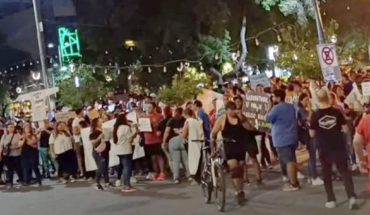
During the past week I had several conversations via Facebook Live with different mayors of the Biobío Region; leaders of communes such as Lebu, Coronel, Penco, Cabrero or Los Angeles, territories of very disparate realities, which have different needs and with different productive vocations, but with an experience in common in recent years: suffering the abandonment and absence of a central and regional government that does not reach its communes.
This is not very different from what we saw in all the national media during the past week, when, following the discussion of the third retreat, realities have been shown from sectors located on the periphery of the Metropolitan Region and which have suffered for years from preferential decision-making towards the communes of the “thousand level” and based on their realities. We just don’t see any further.
And you will wonder, what can you have in common Puente Alto and Lebu? Penco and Buin? All are communes that require, for their proper development, the presence of a strong State and that it, through their respective Regional Governments, can arrive with an effective, timely, efficient and non-discriminatory resource transfer to the inhabitants of those territories.
But what’s the reality? The unfortunate reality is that we live in a country with a centralist system, which designs standardized solutions for the whole country, where regions have no capacity to influence the relevance of solutions designed in central government to solve their problems, which regularly arrive poorly designed and late. The central government manifests itself in the region, through a “designated” mayor from Santiago, which usually lasts just over a year in office, so in practice it merely implements national guidelines and does not think about a regional development strategy that transcends governments on duty.
This is aggravated, as these mayors often respond to a political godfather with a seat in Parliament and in practice is unfolding between favoring the interests of the central government and the interests of its godfather, which is manifested by favouring the allocation of resources to communes that have political leadership related to the government in turn and politically discriminating against those communes that are not related to this government or the interests of their mentor.
Decentralizing is not a concession to regions, it is an opportunity to grow as a nation. To the extent that regions generate identity and have the space to constitute, from their own individuals and cultural and geographical characteristics, initiatives and projects that represent and identify them, it will be possible to strengthen their local economies.
Now, a legitimate sense of decentralization entails a policy of real transfer of concrete powers for decision-making and generation of effective regional plans, programmes and policies. The Regional Governor should be the promoter of this decentralization, but his framework of action will be promising as he manages to integrate broad powers.
In this ideal, the constituent process will be key to fostering a new, more equitable and inclusive administrative organic, recognizing the diversity of our regions and their ability to make decisions at the territorial and political level.
After the pandemic, the figures can be revised and we will realize that in the employment revival curve it arrives again in the Metropolitan Region as a priority. While 140,000 jobs were lost at the peak of the pandemic in the region (mostly women), the employment recovery rate is 37% to date, while in the Metropolitan Region it is about 55%; and just to name a few other regions of Chile, things don’t change when you look at the rest of the country, in the Coquimbo Region it’s 32% and in Magellan it’s 43%.
As soon as the new Regional Governors take on, it will be very important that they can activate rapidly implementing projects that give employment and activate SMEs. Perhaps the fastest and most efficient way to do this is precisely through transfers from regional governments to their municipalities of freely available direct funds, which do not mean cumbersome applications, through intermediary bodies that charge a significant cut of the money allocated for their service, and whose aid is full of filters that the small entrepreneur , by technical capabilities, often fails to navigate. Thus, the beneficiaries always end up being the same.
This sunor to talk about urgency, because we must look for other ways to advance real decentralization, the Regional Governors elected, regardless of their political color, must work together to make concrete progress in decentralization, with effective achievements such as getting companies to pay in the communes where they operate and we do not continue to contribute to the four communes where decisions are made across the country , have money available to “donate” in times of crisis, such as the one we saw from Las Condes to La Pintana, which are only 23 kilometers away geographically, but so far from development and social integration.
Work with municipalities will be strategic and essential for the search for regional consolidation. Governors will be great regional mayors and mayors will be small communal governors. Something that may seem confusing, but that reflects the anchoring of this strategic partnership, where communication and dialogue must prevail, seeking the good of its communes and the region that houses them. They will be two great representatives of the people, a duple that can be well articulated to reach a high level of regional hegemony.
The content poured into this opinion column is the sole responsibility of its author, and does not necessarily reflect The editorial line or position of El Mostrador.





